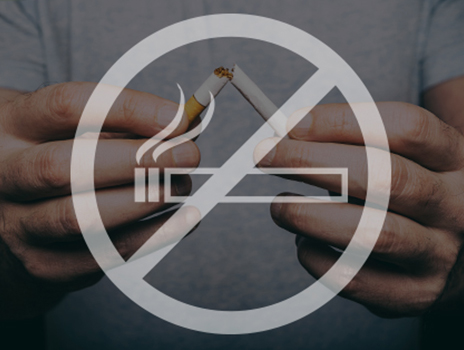October 07, 2019
Millions of tobacco users check into hospitals across the U.S. each year, but very few get help to quit smoking ̶ which is often the root cause of what put them in the hospital.
Rather than just treat the patient for their smoking-related health issues, The University of Kansas Health System and the University of Kansas Medical Center’s Department of Preventive Medicine and Public Health developed a bedside tobacco cessation program. The service allows providers to proactively work with patients to help them kick their smoking habits.
On Sept. 1, 2006, the entire medical center campus, led by The University of Kansas Health System, went smoke-free. That same day, the hospital launched its bedside tobacco treatment service, UKanQuit. Doing so made our hospital and university campuses among the first in Kansas to provide clean air ̶ inside and out ̶ to all visitors, students, patients and staff.
UKanQuit was created to help inpatient smokers get symptom relief from their craving and withdrawal. It was also an opportunity for them to re-evaluate their tobacco habit and begin the journey to quit.
Edward Ellerbeck, MD, MPH, general internist and program director for The University of Kansas Cancer Center’s Cancer Control and Population Health program, and I were the proud parents of this groundbreaking partnership.
Research shows that hospital-based tobacco cessation is effective. Counseling that begins in the hospital and continues for at least 1 month after discharge can increase the odds of quitting by 37%.
Since its founding in 2006, UKanQuit has treated more than 12,000 patients, averaging more than 1,000 individuals per year, with a patient-reported quit rate of 25%. By comparison, 2010 data from the National Health Interview Survey shows that only 6.2% of all smokers quit in a given year, although 7 out of 10 people say they want to quit.
About UKanQuit
UKanQuit’s clinical home is in Patient Care Services, under the leadership of Chris Ruder, RN, chief operating officer, Kansas City Operations, The University of Kansas Health System. It is fully integrated into the electronic health record and clinic workflows. Quitting smoking speeds recovery and prevents future illness.
UKanQuit works with patients’ healthcare teams to ensure patients get high-quality care to achieve optimal outcomes. Services include:
- Identifying inpatients who smoke
- Assessing dependence, craving and interest in quitting
- Coordinating medication and counseling at bedside and at discharge
- Documenting care
- Conducting follow-up with patients at 1-month post-discharge to assess outcomes
In addition, UKanQuit serves our teaching mission as a platform for training medical students, residents, master’s in public health students and PhD students. It’s a unique learning environment because it combines high-quality hospital treatment with extremely rigorous training in research methods.
UKanQuit has been a platform for a number of large National Health Institutes-funded clinical trials to discover the best way to engage smokers in cessation services before they leave the hospital. In addition, 9 peer-reviewed articles have been published on the program.
This is one of many cancer center endeavors that focuses on prevention. The Cancer Control and Population Health program was developed explicitly to identify better ways to introduce prevention strategies into high-risk and underserved communities.
